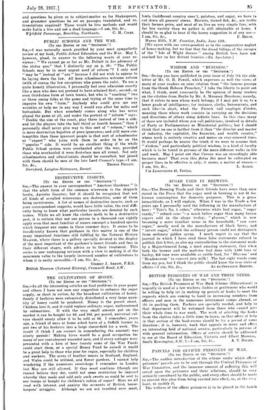THE CULTIVATION OF HONEY.
[To ran Berme or sun "Seeersme."1 Sre,—In all the interesting articles on food problems in your paper end others I have not seen any suggestion to enhance the sugar supply, so short in ration, by the broadcast cultivation of honey. Surely if beehives were extensively distributed a very large quan- tity a honey could be produced. Honey is the purest sweet. Children love it, and it could replace ordinary sugar, unthreatened by submarines. If with the very small amount put on the merket it can be bought for ltd. and 10d, per pound, universal cul- ture should sorely allow it to be sold at 4d. I remember, years ago, a friend of ours at home asked leave of n Suffolk farmer to put two of his beehives into a largo clover-field for a week. The result (I think I am correct in remembering the amount) was ninety pounds! Making hives would be a good occupation for many of our convalescent wounded Men, and if every cottager were presented with a hive of bees (surely some of the War Funds souls' start them, or a special Honey Fund be raised) it would be a great help to those who pine for sugar, especially for children and workers. The acres of heather moors in Scotland. England, and Wales could be utilized, and flower gardens. I cannot help wondering it the numerous sweetshops I remember in London last May are still allowed. If they must continue (though one cannot believe they do), could not some restriction be imposed whereby they made and sold only such sweets as could be sent to our troops or bought for children's ration of sugar? Here we all read with interest and anxiety the accounts of British house- keepers' struggles. Although we are not troubled over meat,
fowls (indifferent country ones!), potatoes, and sugar, we have Is cut down all grocers' stores. Biscuits, tinned fish, Ac.. are treble their former price, and most of us live on very simple fare, with far less variety than we gather is still obtainable at home. should be to glad to hear if the honey suggestion is of any use.—
I am, Sir, Ae., F. BRIT,. Ilfurne Hills, N.W. Frontier, India, June 15111.
[We agree with our correspondent as to the comparative neglect of honey-making, but we fear that the dread tidings of the ravages of the "Isle of Wight disease " among British hees have not reached her on her distant frontier.—En. Spectator.]


































 Previous page
Previous page